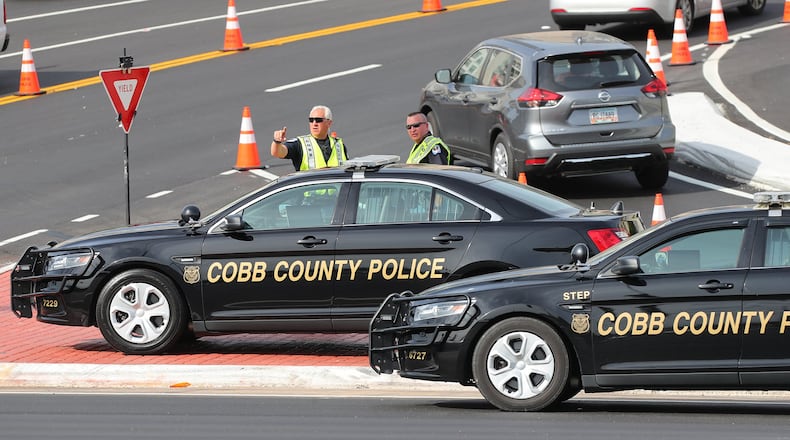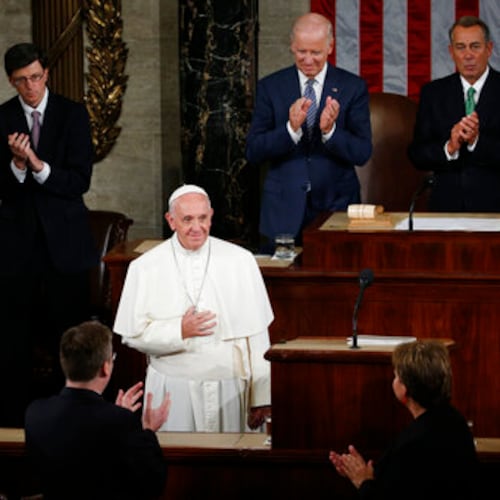The day after Christmas, just three months before the first game at SunTrust Park, Cobb police chief John Houser sent a memo to his boss putting the estimated cost of traffic control outside the new stadium development at more than $1 million a year.
It was the first time anyone put a hard number on what promises to be a significant expense for county taxpayers over the 30-year life of the stadium deal.
The stadium operating agreement between the Braves and Cobb County is silent about the county’s obligation to pay for traffic control, and two Cobb commissioners told The Atlanta Journal-Constitution that the issue was never discussed publicly.
The Braves paid for traffic control during the team’s last eight seasons at Turner Field. At Mercedes-Benz Stadium, the Falcons will reimburse the Georgia World Congress Center an estimated $2.5 million a year for traffic management during football games, soccer matches and other events.
Former county manager David Hankerson, who recently retired, was surprised to learn that the Braves paid for traffic control in Atlanta.
"That's news to me because … we were told that the Braves would take care of everything inside the stadium and Atlanta took care of everything outside the stadium," Hankerson said. "If it was something different, this is the first time I've heard of it."
An AJC survey of 11 cities with professional sports stadiums found only two other instances where taxpayers funded all or a portion of traffic control. The survey included the Georgia Dome, where the state collected revenue from things like parking and food sales at the facility to offset that $1.7 million annual expense.
Roger Noll, economics professor emeritus at Stanford University, said the AJC's findings in the limited survey are valid across the NFL and Major League Baseball. The vast majority of teams reimburse municipalities for police, or cover the cost with rent payments, or just pay for it outright, he said.
“Almost every case is special,” said Noll, who studies the economy of sports. “In some cases security is provided by local government, but that’s rare and diminishing because there is growing public resistance to subsidy.
“The Falcons outcome is the norm. The Braves outcome is a throwback to the 1990s” when those kinds of subsidies were more common, he said.
The Braves are paying for traffic control and security inside the ballpark and mixed-use development.
In a statement, the Braves said the city of Atlanta paid for traffic control during their first 43 years in town, but the team was asked to begin absorbing those costs about 2009 — when the Great Recession decimated municipal budgets as property values tanked.
The team also said traffic management at SunTrust Park is not comparable to Turner Field because the two are “drastically different and require different levels of support.”
SunTrust Park “is surrounded by a privately-funded, $550 million, 1.5 million square foot mixed-use development and is activated 365 days a year,” the Braves said in an email. “Additionally, Turner Field was in a residential neighborhood with little activity on a nightly basis, while SunTrust Park sits in the heart of a thriving commercial district with constant activity.”
‘Board not kept in the loop’
The Stadium Operating Agreement, ratified by the Cobb Commission on May 27, 2014, outlines most obligations big and small: from insurance and taxes to rent and maintenance.
One notable exception: the document does not deal with traffic control outside of the Braves’ development.
The omission is surprising considering much of the angst about the stadium revolved around how much additional congestion it would cause in the Cobb Parkway corridor, one of the busiest in the state.
It’s also surprising because traffic control could ultimately cost taxpayers more than $30 million over the life of the contract. Meanwhile, the county’s $35 million commitment for 30 years of capital maintenance at the stadium is spelled out with specificity in the operating agreement.
Instead, the contract only addresses the team’s responsibility for security and traffic control inside the stadium and mixed-use development.
Commissioners Bob Ott and Lisa Cupid said the county's obligation to fund traffic control didn't come up in the years of public discussion and planning leading up to the stadium's grand opening.
Ott blamed former Commission Chairman Tim Lee.
“I think part of the disconnect is with the former leadership,” Ott said. “The entire board was not kept in the loop on many things. At the time, there was not a discussion of the financial aspects, it was more what are the needs to get this to work and to be safe. There was not necessarily a discussion as to the cost or who was going to be paying it.”
Cupid was the only commissioner to vote against a preliminary agreement with the Braves, because she thought the deal lacked transparency and was rushed by Lee's demand for a vote just two weeks after the stadium negotiations became public. She said the cost of traffic control was never discussed.
"Sometimes as a commissioner, you don't know what questions to ask if you don't know what the issues are," Cupid said.
Lee, who lost his seat on the board to Mike Boyce in November, did not return multiple cell phone and email messages, asking if traffic control outside the development was part of the stadium negotiations, if he agreed to have taxpayers cover the cost and why that commitment isn't in the Braves' contracts.
Cobb Public Safety Director Sam Heaton, who was promoted from fire chief in January 2014, said he has known since early on that taxpayers would be responsible for traffic control.
“The traffic was always a piece that was going to be left to us, primarily because the traffic is not just at the stadium,” Heaton said. “We’ve got people as far away as Windy Hill Road.”
Taxpayers overall commitment to the stadium includes $376 million in debt, a portion of which will be repaid by Braves' rent; $14 million for infrastructure inside the development; $10 million from the Cumberland Community Improvement District, also for infrastructure; and at least $75 million in road improvement projects around the stadium.
The Braves self-financed its $550 million entertainment district called The Battery Atlanta, and is paying property taxes on that portion of the project.
County to pay overtime
The Dec. 26 Houser memo did more than just set out the cost of traffic control, it also signaled a major change in policy.
Instead of using on-duty officers to keep cars and pedestrians moving safely around the stadium, Houser suggested paying overtime to volunteer officers for the 6 1/2-hour shifts. It was a change embraced by Heaton and the police command staff.
Houser has since retired. Interim police chief Tim Cox said the county might reconsider paying overtime in the future, but not now.
“We’ve made the commitment that I’m not pulling officers from the precincts,” Cox said. “As much as we want to provide sufficient public safety for the park, we don’t want to compromise public safety for people making 911 calls. I don’t want to draw from the precincts and pull an officer out of a beat to direct traffic.”
Cobb has settled into a plan to have 40 officers at intersections surrounding the ballpark. Each officer is on-duty, but volunteering to work the detail on overtime so as to not draw resources away from the police department’s five precincts.
The number of officers working the stadium has been reduced since Houser’s initial estimate, and now will cost an estimated $900,000 per year, using average salaries for 33 officers, five sergeants and two lieutenants.
Those salary averages don’t include an already-approved pay increase, or any future wage increases over the next three decades, the life of the county’s contract with the Braves.
A big percentage of the officers come from the department's special operations division — units like SWAT and the DUI task force — which generally don't cover beats or respond to 911 calls.
The current estimated per-game cost is $11,066. Post-season games and concerts, like Billy Joel last month and Metallica in July, are extra and will cost the same.
The county did not budget for the expense and will instead use reserves from its general fund to pay for traffic control this year, which is another aspect that Cupid said was not discussed with the commission.
‘Frustration level will grow’
The Braves said years of planning and coordination resulted in “one of the largest and most integrated transportation management and public education programs this state has ever seen.”
In addition to the 40 cops working traffic control, another 60 to 70 off-duty officers are hired by the Braves for security details inside the stadium, the mixed-use development and parking areas.
Retired Sgt. Steve Gaynor, president of the Fraternal Order of Police Lodge #13, is worried about the strain that could cause over the long haul. The department has an authorized force of 690 officers, but has about 40 open positions, according to Cox.
Regardless of who pays, fully staffing SunTrust Park and the surrounding development will take about one-sixth of the department’s manpower for nearly three months out of every year, Gaynor said.
“There are a couple of home stands that are nine days straight, and all those people need to cover their own duties,” Gaynor said. “Right now it’s brand new, and we’re only (14) games in. But what’s going to happen when when we’re 60 games in, it gets hotter and hotter and they get tired? The frustration level will grow.
“I would say the membership is concerned to see what’s going to happen.”
Cobb Sheriff’s Office deputies also work security inside the stadium, and Heaton said the county has started recruiting firefighters on overtime to work some of the pedestrian crossings outside the development.
Goal is fewer officers
Police staffing at the stadium was controversial from the very beginning.
Former Public Safety Director Jack Forsythe resigned in frustration just a month after the stadium announcement, with a stinging letter that accused Lee and Hankerson of ignoring repeated warnings about insufficient staffing, high turnover, low pay, substandard vehicles and faulty equipment. Forsythe also warned that the county needed to grow the department to be ready for the stadium opening.
"As a result of these outstanding issues, there is an immediate need for a major infusion of resources," Forsythe's January 2014 resignation letter said. "This need has been exacerbated" with the Braves' announcement, he said.
Heaton took over as public safety director and within a few months had a police improvement plan approved that included 80 new positions, take-home vehicles for officers and 10-hour shifts to reduce manpower shortages during shift changes. The plan was nearly identical to Forsythe's.
He said the department might eventually be able to direct traffic outside the stadium with fewer officers.
“The goal was to eventually not have officers for traffic at all, just primarily for safety,” Heaton said. “Will we get there? I’m not sure. That’s part of the process of doing this over and over and over, until we have what we determine is a minimum for every event.
"That may take us a majority of this year to figure out."
Keep Reading
The Latest
Featured








